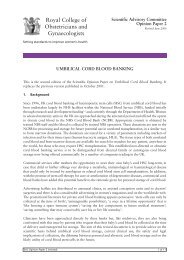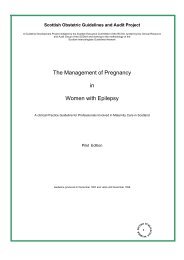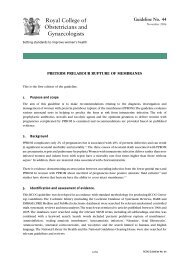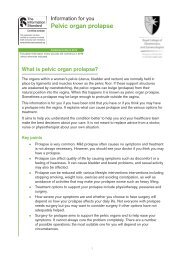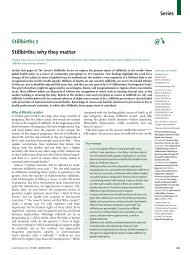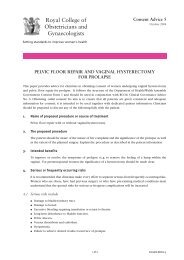Cord blood banking - information for parents
Cord blood banking - information for parents
Cord blood banking - information for parents
You also want an ePaper? Increase the reach of your titles
YUMPU automatically turns print PDFs into web optimized ePapers that Google loves.
Private (commercial) banks<br />
People can store cord <strong>blood</strong> with a private bank in the hope that, in the future, cord<br />
stem cells may be useful, should a member of their own family develop a disease<br />
treatable by stem cell therapy.<br />
The chances of your child ever needing to use his or her own cord <strong>blood</strong> are extremely<br />
small, so there is no guarantee that the cord <strong>blood</strong> will ever be needed. Nevertheless,<br />
you may feel this is worthwhile, like an insurance policy.<br />
There is a fee <strong>for</strong> collection and long-term storage of up to £1,500. Depending on<br />
circumstances, some private banks may store cord <strong>blood</strong> free of charge <strong>for</strong> certain<br />
families where there is a known genetic condition.<br />
If you have not banked with a private bank and your child develops a <strong>blood</strong> related<br />
disorder, immune system disorder or metabolic storage disorder in the future, then<br />
you still have other options. These are:<br />
●<br />
●<br />
cord <strong>blood</strong> from a public bank in the UK or internationally.<br />
use of other sources of therapy such as bone marrow transplants. There is<br />
worldwide collaboration with international bone marrow registries to find<br />
suitable matches <strong>for</strong> patients who require a bone marrow transplant.<br />
●<br />
treatment from a sibling who matches a family member who can give bone<br />
marrow.<br />
Full written <strong>in<strong>for</strong>mation</strong> on the private <strong>banking</strong> policy at your hospital should be given<br />
to you at your antenatal booking appointment. This <strong>in<strong>for</strong>mation</strong> may not be given<br />
routinely, so you may need to ask if you would like to find out more.<br />
The RCOG remains unconvinced about the benefit of storing cord <strong>blood</strong> with a private<br />
bank <strong>for</strong> families who have no known medical reason to do so.<br />
How is cord <strong>blood</strong> collected safely?<br />
<strong>Cord</strong> <strong>blood</strong> must be collected safely. It is important that:<br />
●<br />
●<br />
a trained technician who is not involved in your or your baby’s care collects the<br />
cord <strong>blood</strong>. It is important that neither your obstetrician nor your midwife<br />
should be distracted from looking after you and your baby during and<br />
immediately after childbirth.<br />
there should be no alteration in your ‘usual management’ of labour, such as the<br />
delivery of the placenta or clamping of the cord. Some evidence indicates that<br />
immediate cord clamping may be harmful to babies. However, delaying cord<br />
clamping can prevent a successful cord <strong>blood</strong> collection.<br />
●<br />
cord <strong>blood</strong> should be collected after the placenta has been delivered in a clean<br />
5




